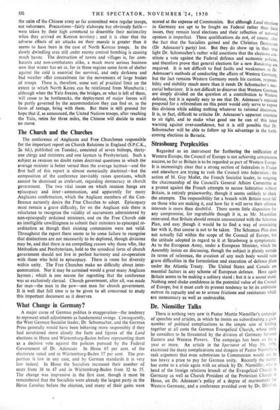Strasbourg Perplexities
Regarded as an instrument for furthering the unification of Western Europe, the Council of Europe is not achieving conspicuous success, so far as Britain is to be regarded as part of Western Europe. It is increasingly clear that a strong section of federalists in France and elsewhere are trying to rush the Council into federation ; the action of M. Guy Mollet, the French Socialist leader, in resigning the chairmanship of the Council's General Affairs Committee as a protest against the French attempts to secure federation without Britain, is entirely praiseworthy, though it seems unlikely to check the attempts. The responsibility for a breach with Britain must fall on those who are making it, and how far it will serve their ultimate interests is more than doubtful. There seems little disposition for any compromise, for regrettable though it is, as Mr. Macmillan reiterated, that Britain should remain unassociated with the Schuman Plan, and easy _though it would be to find a way of associating her with it, that course is not to be taken. The Schuman Plan does not actually fall within the scope of the Council of Europe, but the attitude adopted in regard to it at Strasbourg is symptomatic. As to the European Army, under a European Minister, which the Assembly insists on discussing, though the subject is plainly outside its terms of reference, the creation of any such body would raise grave difficulties in the formulation and execution of defence plans under the Atlantic Treaty. The United States and Canada are essential factors in any scheme of European defence. Here again Britain seems to be making a solitary stand ; but it is a sound stand. Nothing need shake confidencesin the potential value of the Council of Europe, but it must curb its present tendency to let its ambitions outrun its capacity and so to arouse frictions and resistances which are unnecessary as well as undesirable.














































































 Previous page
Previous page